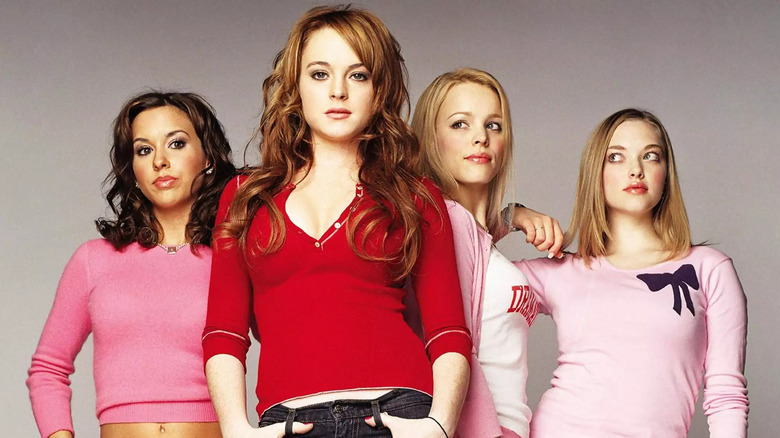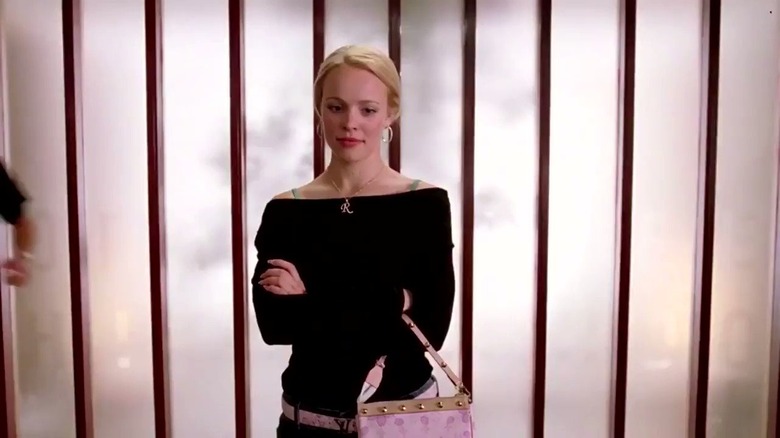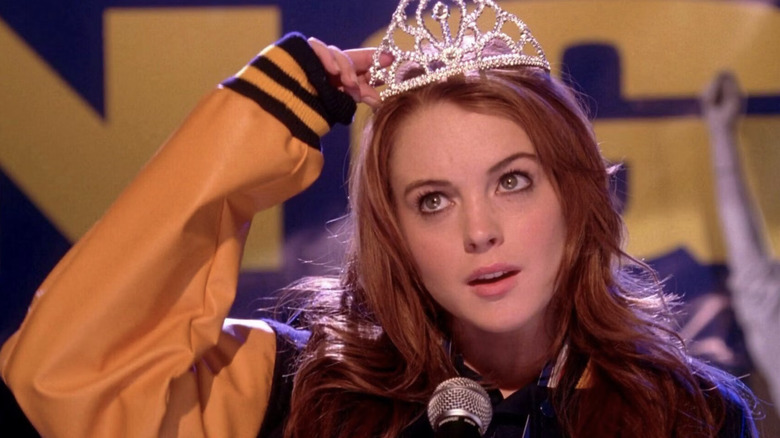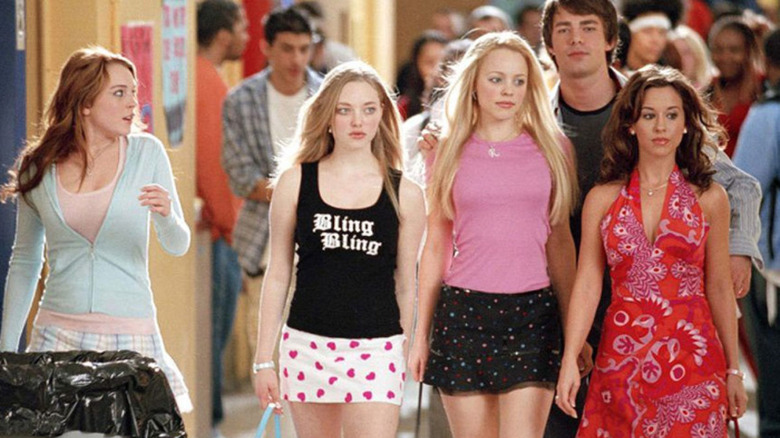Mean Girls Ending Explained: Girl World Was At Peace ... But Should It Have Been?
Apologies to the millennials who are about to pass out with the following information, but "Mean Girls" turned 18 this year. In the nearly two decades since Mark Waters and Tina Fey's masterpiece hit theaters, "Mean Girls" has become one of the most beloved films of the aughts. Every October 3 is celebrated as "Mean Girls Day," moments of the film like "She doesn't even go here!" have become part of our cultural vernacular, and I'd bet money that a lot more people know the choreography to "Jingle Bell Rock" than are willing to admit. "Mean Girls" was and continues to be extremely relatable, as the wild jungle of high school social hierarchies evolve and yet somehow stay exactly the same.
Cady Heron (Lindsay Lohan) enters public school for the first time as a junior in high school, never having experienced the cruel cliques or popularity warfare on campus, where she unwittingly finds herself taken under the wing of The Plastics (played by Rachel McAdams, Amanda Seyfried, and Lacey Chabert), the ruthless popular girls who rule the halls of North Shore High. Cady is put up by her friends Janis (Lizzy Caplan) and Damian (Daniel Franzese) to use her newfound popularity to infiltrate and destroy The Plastics from within, but Cady gets caught up in the allure of popularity and ends up in the middle of a school-wide girl fight. "Mean Girls" offers brutally honest commentary on the unbelievably cruel era of teen girl culture in the 2000s, but you wouldn't know that from its weirdly safe and pedestrian ending.
Mean Girls succeeds because it's, well, mean
With the exception of films like "Heathers" or "Jawbreaker" (which despite their cult followings were poorly received at the time of release), "Mean Girls" is one of the best showcases of the genuine ferocity possessed by teen girls. I've quoted it before and I'll quote it again, "Jennifer's Body" had it right: "Hell is a teenage girl."
Part of why "Mean Girls" stands out against its contemporaries is its unflinching approach to meanness. The scheming and villainy shown throughout is enough to make Cersei Lannister blush in adoration. The source of the story's conflict lies mainly with "The Burn Book," the holy bible of The Plastics that's nothing more than a scrapbook of s*** talking.
The Plastics aren't here to call their classmates "losers" and nerds," but rather "fat wh***s," "fugly sl***," "grotsky little byotches," and out them for having hooked up with the gym teacher or having "made out with a hotdog." Regina George is teen girl evil personified, with Rachel McAdams being the sole female nominee for "Best Villain" at the 2005 MTV Movie Awards. Regina scans and releases the pages of the Burn Book simply for the chaos of it all, sparking a school-wide fight that culminates with her getting hit by a bus while trying to argue with Cady after Ms. Norbury (Tina Fey) successfully did some community-building.
From this moment forward, "Mean Girls" stops being mean, and becomes a soft, squishy, feel-good teen movie.
Girl world was at peace
Everything at North Shore high is now really weird. The Plastics have all gone their separate ways, Cady is grounded for the rest of her natural-born life, but thanks to the junior class nominating Cady Heron for Spring Fling Queen because they think she pushed Regina George in front of a bus, she wins. Cady shows up at Spring Fling not in a gown, but in her Mathletes uniform, having joined the team as a means to make amends with Ms. Norbury. She delivers a moving speech about how all of the women of North Shore high should "share it," and breaks the clearly plastic tiara, throwing the bits into the audience like a weird Oprah giveaway.
Cady spent her life growing up in Africa with her research zoologist parents and often compares Girl World to a jungle, which is why the ending feels so out of place. Regina George gets hit by a bus and doesn't try to stab Cady with her spinal halo bars? Girl World gets thrown some cheap plastic and suddenly decides that bullying isn't cool anymore? No one is genuinely held accountable for anything? I mean, Cady was grounded, sure, BUT SHE WAS STILL ELECTED SPRING FLING QUEEN!
Nope. Instead, cliques have been destroyed, everyone is making friends outside of their social groups, and everyone lives happily ever after. That's really sweet and idealistic and all, but completely undercuts the entire movie.
A squeaky clean ending
The contrived and seemingly "Full House"-inspired ending feels like it was made at the request of the studio, who we know required a handful of other changes to keep the movie PG-13. For example, Amber D'Alessio's "made out with a hot dog" insult was originally supposed to be about her doing a different intimate action that starts with the letter "M" and makes a lot more tangible sense for an object shaped like a hot dog, but the studios made them change it. When the film was released, the ending was frequently called out by critics who found it to be too saccharine compared to the edginess of the rest of the film, with J.R. Jones of the Chicago Reader saying the film "lacks the genuine bile that made 'Heathers' so bracing."
Of course, daring to say that "Mean Girls" is anything other than perfection is setting myself up to have my face cream swapped for foot cream, but I think enough time has passed that we're ready to have this difficult conversation. The ending of "Mean Girls" is a fantasy look at the way we wish the world worked, but it doesn't, and it delivers a proverbial CD player to the face of the film's integrity. Trust me on this, I'm an expert.



